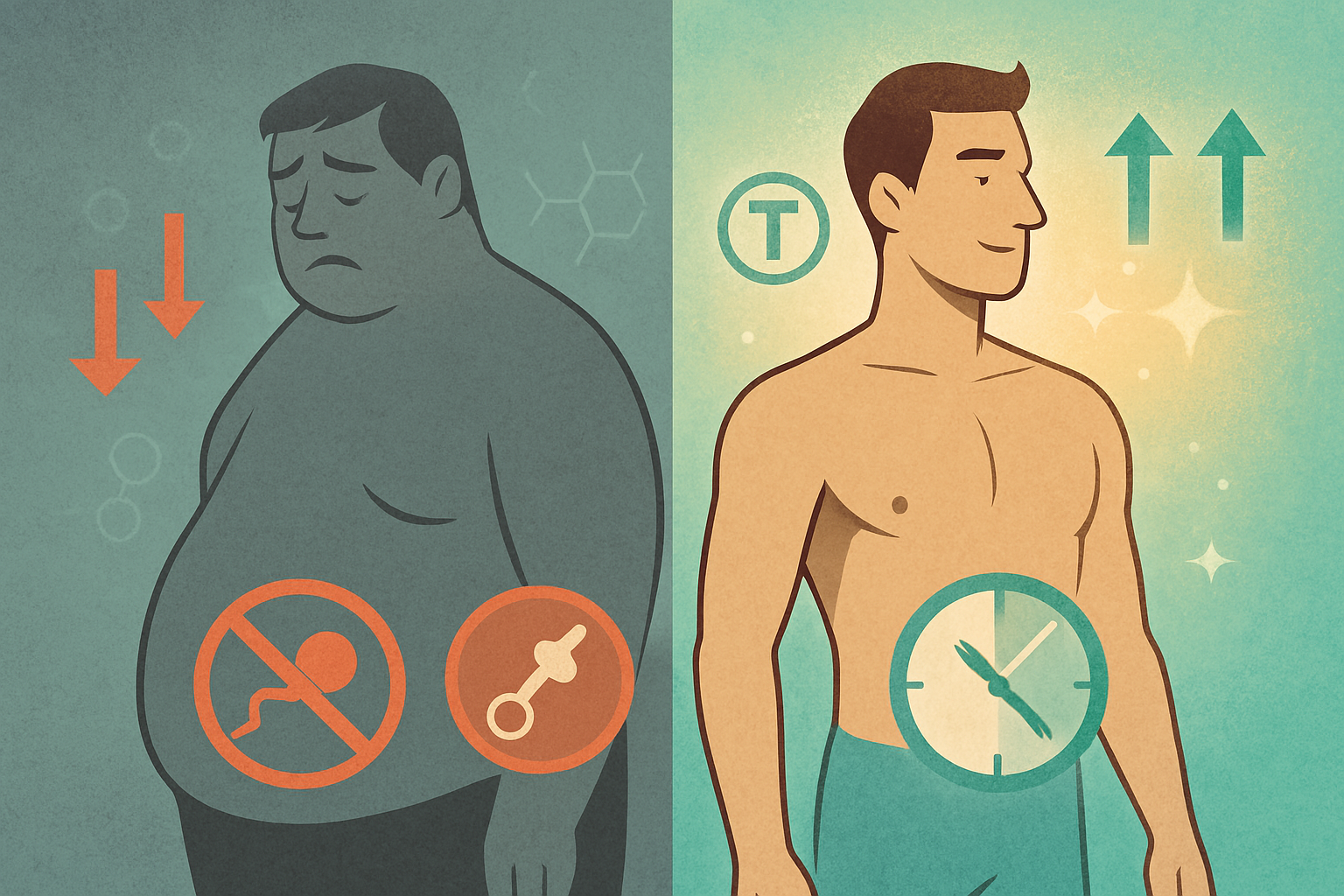A New Strategy for an Old Problem
Erectile dysfunction (ED) is a condition with many contributing factors — including blood flow, hormones, metabolism, and inflammation. Recently, intermittent fasting (IF) has gained popularity for its potential to improve metabolic health, reduce body fat, and even support hormone balance. But does intermittent fasting have any real impact on erectile function? The answer, backed by emerging research and anecdotal evidence, is: yes, it might help — especially if ED is related to lifestyle and metabolic issues.
What Is Intermittent Fasting?
Intermittent fasting is not a diet, but rather an eating schedule. The most common method is the 16:8 protocol — fasting for 16 hours and eating during an 8-hour window. Other variations include:
- 18:6 or 20:4 protocols
- Alternate day fasting
- 5:2 approach (eating normally 5 days, restricting calories for 2)
During fasting periods, you avoid calories but can consume water, black coffee, or tea. The idea is to give the body a break from constant digestion so it can focus on repair, fat burning, and hormone optimization.
How Fasting May Improve Erectile Function
1. Improved Insulin Sensitivity
High insulin levels caused by poor diet and frequent eating are a major contributor to erectile dysfunction, especially in overweight or prediabetic men. Intermittent fasting helps lower insulin levels and improve sensitivity — which enhances blood flow, hormone production, and cellular health.
2. Increased Testosterone
Some studies suggest intermittent fasting can boost luteinizing hormone (LH) — a hormone that signals the testes to produce testosterone. While the increase may be modest, improved insulin sensitivity and reduced body fat also indirectly support higher testosterone levels, which enhances libido and erection quality.
3. Reduced Inflammation
Chronic inflammation damages blood vessels and nerves — two systems essential for strong erections. Intermittent fasting activates autophagy, a cellular clean-up process that removes damaged cells and reduces inflammation throughout the body.
4. Fat Loss and Hormonal Balance
Excess body fat, particularly around the belly, leads to lower testosterone and impaired blood flow. Fasting supports natural fat loss, even without strict calorie counting, which can help reverse ED caused by obesity or metabolic dysfunction.
5. Boosted Human Growth Hormone (HGH)
Fasting increases HGH, which plays a role in tissue repair, muscle mass, and libido. While not a direct fix for ED, higher HGH levels contribute to better overall vitality and performance.
The Mind-Body Connection
Fasting can also enhance mental clarity, focus, and self-discipline — all of which may help reduce performance anxiety and improve emotional well-being. Many men report that IF helps them feel more in control of their health and more confident — two factors that indirectly support sexual performance.
What the Science Says
While research on intermittent fasting and ED is still developing, current findings show promising results in related areas:
- A 2020 study found that time-restricted eating improved testosterone levels and body composition in young men
- Studies on IF show improvements in blood pressure, cholesterol, and insulin sensitivity, which all benefit erectile function
- Animal studies show increased reproductive hormones and better testicular function with fasting protocols
More direct human studies on ED are needed, but the indirect benefits are clear and well-supported.
Who Might Benefit Most From IF?
Intermittent fasting is especially effective for men with:
- Overweight or obesity
- Type 2 diabetes or insulin resistance
- Low testosterone
- High blood pressure or metabolic syndrome
- Lifestyle-related ED (caused by poor diet, stress, or inactivity)
However, IF may not be the best approach for men who are underweight, have a history of eating disorders, or take medications that require food intake at certain times.
Getting Started Safely
Start Gradually
Try a 12:12 fasting window, then build up to 14:10 or 16:8 as your body adapts.
Stay Hydrated
Drink plenty of water, black coffee, or herbal tea during fasting periods to stay energized and avoid headaches or fatigue.
Break Your Fast With Whole Foods
Focus on nutrient-dense meals rich in protein, healthy fats, fiber, and antioxidants. Avoid breaking your fast with sugar or refined carbs.
Avoid Overeating
Fasting doesn’t mean bingeing later. Eat until satisfied, not stuffed, and stay consistent with your eating window.
Combine With Lifestyle Habits
Exercise, sleep, and stress management amplify the benefits of IF and support erectile health even further.
Possible Side Effects and Considerations
- Hunger and irritability (especially in the first few days)
- Fatigue or light-headedness if you don’t eat enough during feeding windows
- Potential drop in libido early on, as your body adapts
These effects are usually temporary and resolve as your metabolism adjusts.
Final Thoughts: A Tool, Not a Magic Cure
Intermittent fasting isn’t a cure-all, but it’s a powerful tool for reversing lifestyle-related ED, especially when combined with smart nutrition, movement, and stress control. By improving insulin sensitivity, boosting testosterone, and reducing inflammation, fasting addresses many root causes of erectile dysfunction. If used consistently and mindfully, it can be part of a holistic approach to restoring energy, vitality, and sexual performance — from the inside out.
